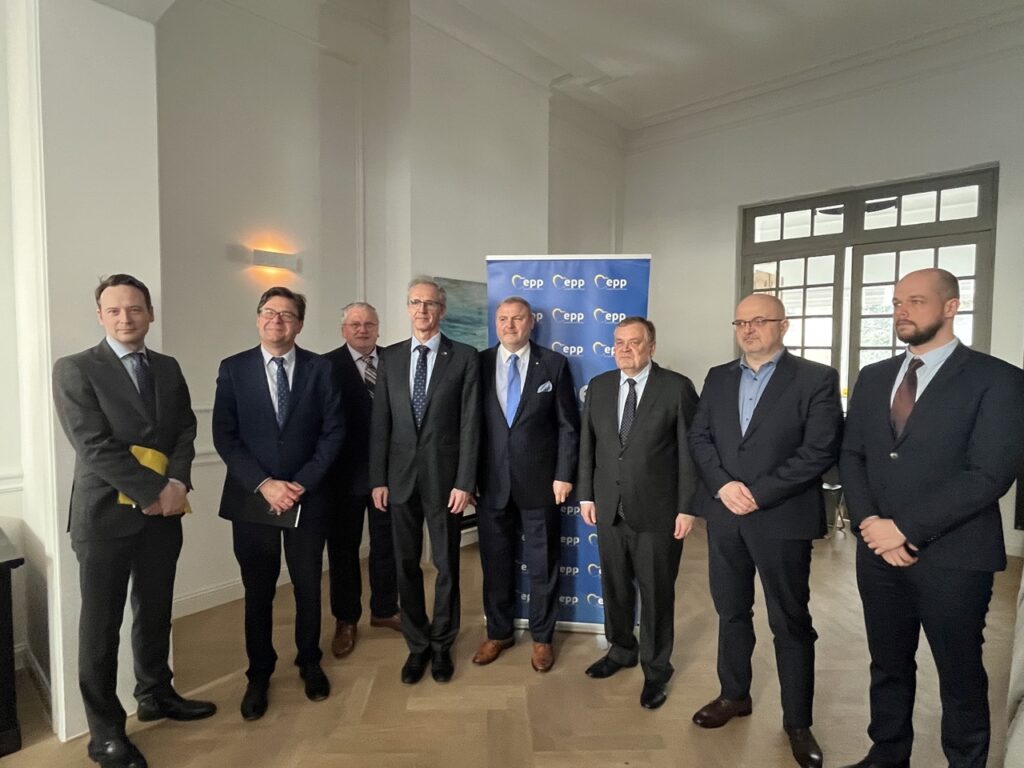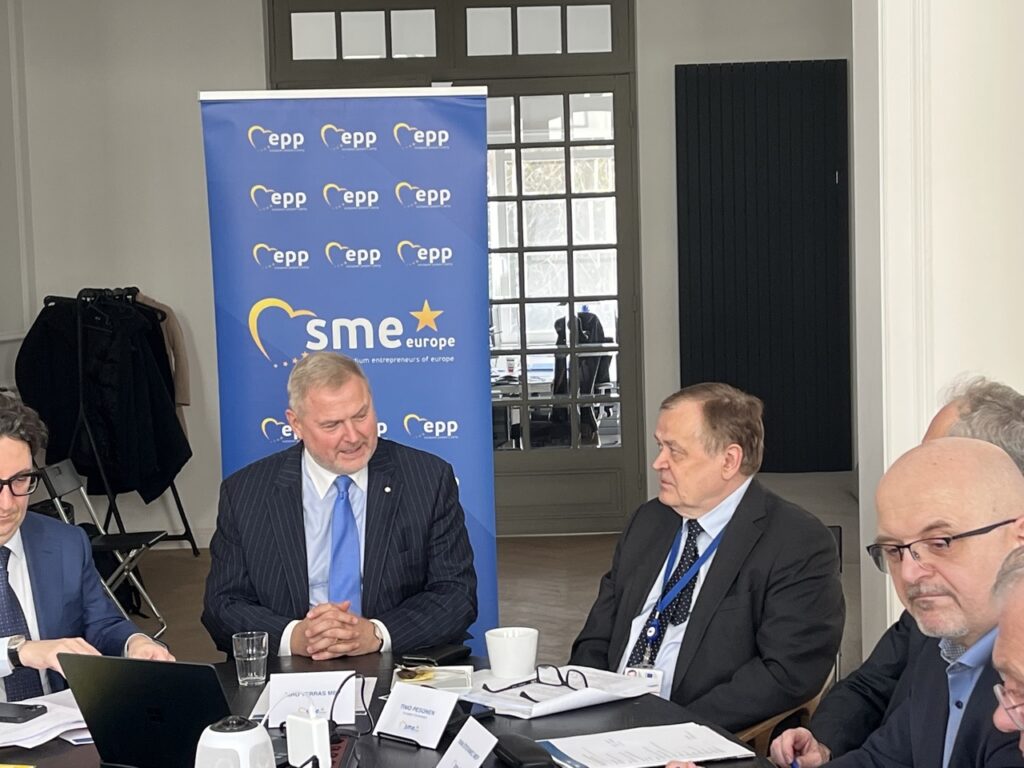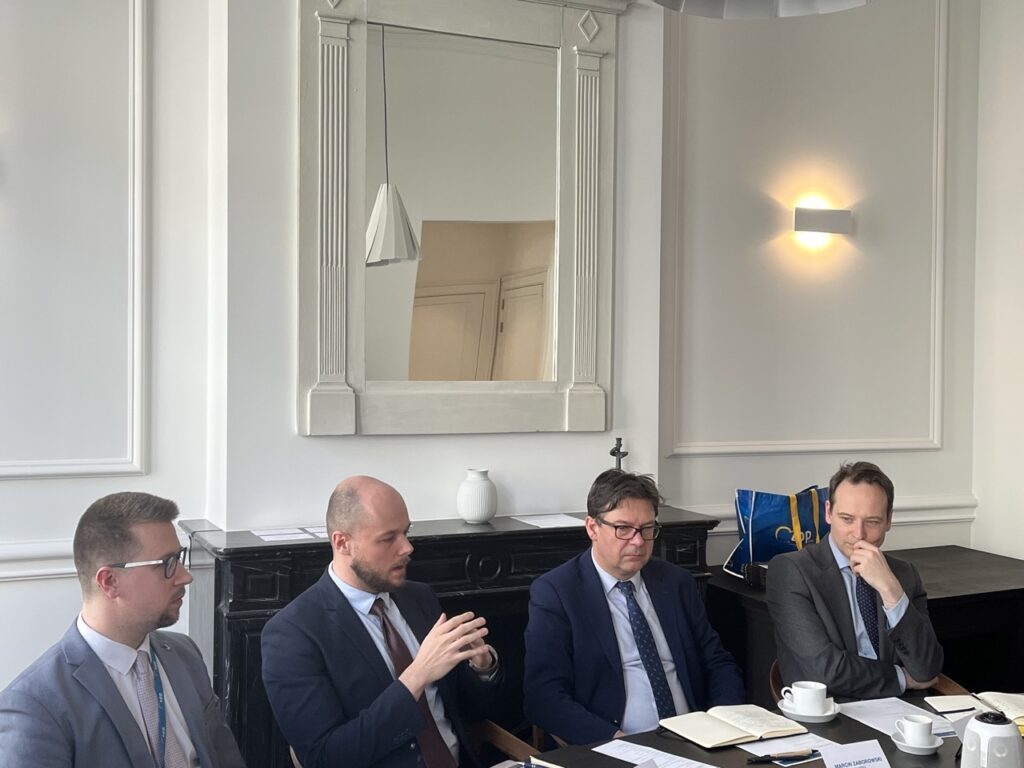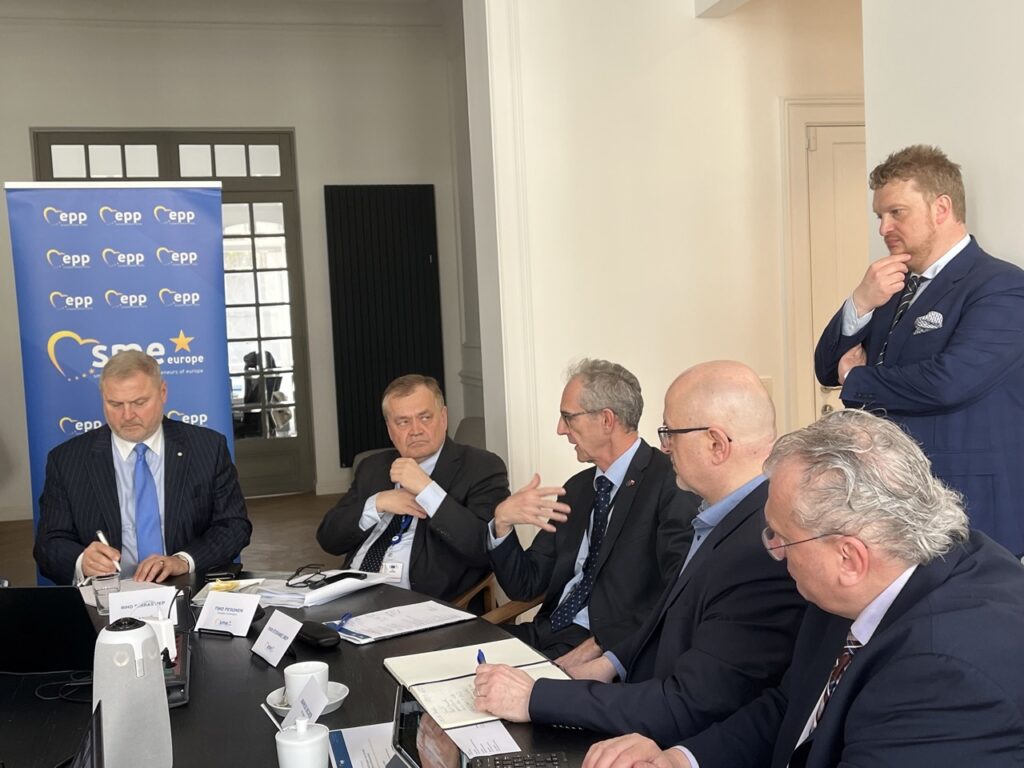EDIS and EDIP regulation – what’s in it for SMEs?
EPP Defence initiative expert meeting

On Tuesday March 19th, EPP SME Defence and SME Europe of the EPP together with Riho TERRAS, MEP, Chairman of EPP SME Defence initiative and Member of the ITRE Committee, organized an event on “EDIS and EDIP regulation – what’s in it for SMEs?” in the Office of SME Europe.
The EPP SME Defence has been established to formulate political demands and instructions for action. The esteemed members include Ivan Štefanec MEP, Sara Skyttedal MEP, Tom Vandenkendelaere MEP, Henna Virkkunen MEP, Arnaud Danjean MEP, Lukas Mandl MEP.
The roundtable saw the participation of Riho TERRAS MEP; Ivan ŠTEFANEC MEP, President of SME Europe; Timo PESONEN, Director-General for Defence Industry and Space at the European Commission; Markus BECKER; Director Business Development for IBV Holding GmbH, Chair of SME Connect Defence Working Group; Ott KEERBERG, Head of Office to MEP Riho Terras; Ivan LEGRADY, Head of Office to MEP Ivan Štefanec; Garvan WALSHE, Research Associate with Wilfried Martens Centre focused on European defence policy; Marcin ZABOROWSKI, Policy Director at Future of Security Programme for GLOBSEC; Matej KANDRÍK, Executive Director for Adapt Institute; Michael JÄGER, Secretary General of Taxpayers Association of Europe; Jonas OLESEN, CEO of Protection Group Danmark; Fergal MAHER, Co-CEO for ACTinBlack; Reimer von ESSEN, COO & International Business Development at ACTinBlack; Robert SMAGALA, Designer-Entrepreneur at Tiger Tailor; Ondřej SLOVÁČEK, Key Account Manager at Promens Zlín and Antonio BRUCO, EMEA Sales Manager at Honeywell. The discussion was moderated by Horst HEITZ, Executive Director of SME Europe of the EPP.
Riho TERRAS, MEP, Chairman of the EPP SME Defence, opened the event to discuss the need for cooperation in the defence industry and expressed concerns about fragmentation, protectionism and financial support. He mentioned the importance of a strategic approach, highlighting the need to balance ends, ways, and means. Mr Terras appreciates the emphasis on SMEs in the Commission’s proposal and seeks further clarity on the process. He highlighted the evolving mindset towards supporting Ukraine, observing a shift in sentiment from recent weeks. With funds allocated for defence and ongoing discussions, there’s optimism that progress is being made.
Timo PESONEN, Director-General for Defence Industry and Space, introduced the new European Defence Industrial Strategy, noting that around 20% of the European Defence Fund is allocated for SMEs, with increasing number. As regards the ramp up programme ASAP, he said that a significant investment of 500 million across 31 projects aims to create over 2 million jobs and boost production in sectors like ammunition and explosives. However, he stressed the need for a more comprehensive strategy going forward.
Key to this strategy is simplifying procedures, particularly for SMEs, and focusing on skill development through initiatives like the European Social Fund Plus program. He also noted the importance of greater financial support and leveraging the windfall profits of frozen assets, alongside ongoing collaboration with the European Investment Bank to facilitate SMEs’ access to funding.

Moreover, he highlighted the need to address the insufficient level of security supply, extending beyond defence to encompass civilian and military needs. Targeted instruments are being introduced to support SMEs in the defence supply chain, with collaboration with NATO and the establishment of an Office for Defence Innovation in Kyiv as vital components of this.
Additionally, Mr. Pesonen emphasized that the ongoing war underscores the importance of Europe uniting and our support for Ukraine is significant. Thus, there are two simultaneous tracks that need to be pursued.
Ivan ŠTEFANEC, MEP, President of the SME Europe, highlighted the potential of SMEs in driving innovation and agility in defence, stressing the urgency of involving them more actively in the process. He advocated for broader involvement in finance, including commercial banks, while expressing concern over some European banks still doing business with Russia. We have to create a common understanding of the urgency and there is a need for increased resources and actions. However, he expressed satisfaction with recent discussions and hoped for a more focused approach from the European Commission, particularly in addressing companies still supplying materials to our enemies.
Marcin ZABOROWSKI, Policy Director at Future of Security Programme for GLOBSEC, discussed the disparity in grant allocations among different countries, citing that for example Polish companies received significantly fewer grants compared to German counterparts. This discrepancy has raised concerns of discrimination and political influence in the grant allocation process. Additionally, he mentions challenges faced by companies in navigating the complicated application procedures which could disadvantage those without strong government support.
Garvan WALSHE, Research Associate with Wilfried Martens Centre focused on European defence policy, called for more energetic usage of cohesion funds and stressed the importance of scaling up. He discussed the need for increased production in defence and expressed concerns about reliance on American support and linked this to the importance of cohesion funds, particularly for countries who are most threatened. He proposed reallocating cohesion funds towards innovation in Central and Eastern European economies. Additionally, he advocated for revisiting dual-use Horizon funding to enhance Europe’s technological base.
Markus BECKER, Director of Business Development for IBV Holding GmbH and Chair of SME Connect Defence Working Group, representing SMEs in the defence industry, discussed their primary focus on producing body armor and ballistic protection. He noted that collaborating with these companies would enable them to easily equip the Ukrainian army, but the challenge remains in the lack of recognition. He concluded by encouraging participation at the Eurosatory 2024: The Global Event for Defence and Security, which takes place in Paris in June.
Matej KANDRÍK, Executive Director for Adapt Institute, highlighted two key points. Firstly, he emphasized the importance of implementing clear actions outlined in the strategy to avoid losing time and to address ongoing challenges in Europe and neighboring regions. Secondly, he addressed the issue of SMEs struggling to keep up with new processes and initiatives, suggesting the need for an interface between SMEs and the Commission to facilitate communication and information campaigns.

Fergal MAHER, Co-CEO for ACTinBlack, expressed concern that funds often cater to individual political interests rather than addressing clear needs for materials like weaponry, ammunition, and protective gear. He emphasized the need for initiatives like the European Defence Fund to support smaller companies without imposing restrictive conditions. He stressed that soldiers prioritize functionality over uniformity and that multiple suppliers can fulfill their needs as long as the quality and effectiveness meet standards.
Reimer von ESSEN, Co-CEO for ACTinBlack, continued the discussion and said that the main issue for small companies in defence is the lack of stability and cash flow. Access to funds, loans, and government projects can be challenging due to delays in payments and limited support from banks. While grants and programs are available, accessing them at European level often requires dedicated personnel, which is not feasible for small companies.
Ivan LEGRADY, Head of Office to MEP Ivan Štefanec, raised a question about the impact of the new European Parliament composition on the negotiations of the new EDIP proposal in the coming years. Secondly, he noted the significance of engaging with citizens and stakeholders while there is a difficulty of public backing for defence initiatives. He pointed out that years of defunding and demilitarization might have unintentionally emboldened the aggressor.
Horst HEITZ, Executive Director of SME Europe, highlighted the importance of addressing dual-use applications in the defence sector, especially considering past involvements in Ukraine and ongoing requests from various industries indirectly connected to the defence supply chain. He stressed the importance of integrating defence and research to foster innovation.
To conclude, it was proposed to inform SMEs in Europe about the Defence initiative and to reconvene for the next meeting in June to give a voice to SMEs in defence sector.


